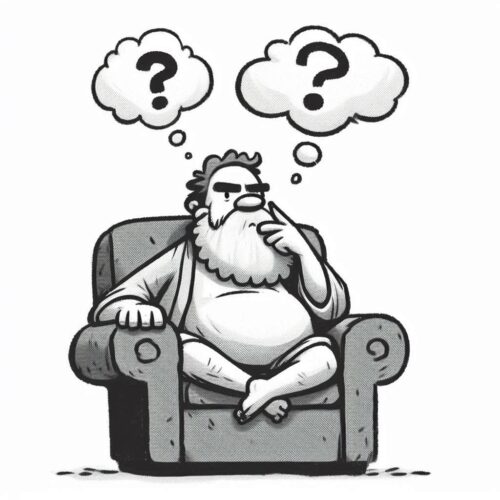If God Ordained Evil, Why Am I Accountable? Find Bible Answers
If God Ordained Evil Why Am I Accountable? All of us have wrestled with this question at some point. If God rules over all things—including evil—how can He justly hold us responsible for our actions? This seeming contradiction has troubled believers and sceptics alike throughout history. Yet, within the pages of Scripture, we find a profound and satisfying answer that both upholds God’s absolute sovereignty and affirms genuine human responsibility.
Understanding God’s Sovereign Control
The Bible presents us with a God who rules comprehensively over His creation. Nothing happens outside His sovereign decree—not the fall of a sparrow (Matthew 10:29) nor the rise and fall of nations (Daniel 4:34-35). This includes even the evil actions of men and angels. Consider Joseph’s brothers selling him into slavery: what they meant for evil, God meant for good (Genesis 50:20). Or ponder the crucifixion itself: Jesus was delivered up according to God’s “definite plan and foreknowledge” through the hands of lawless men (Acts 2:23).
This sovereignty operates on two distinct levels. There’s God’s revealed will—what He commands and desires from His creatures morally. Then there’s His secret, decretive will—what He has ordained to actually occur in history. While God never approves of evil in His revealed will, He has, for wise and holy purposes, ordained that evil exist within His broader plan.
The Nature of Human Responsibility
Yet Scripture equally affirms human moral responsibility. We make real choices with real consequences. When we sin, we sin because we want to—not because we’re forced to. Our actions flow from our own desires, intentions, and decisions. We’re never mere puppets, but moral agents who choose and act according to our own will.
This isn’t a contradiction. Our choices can be both determined (in God’s eternal plan) and voluntary (flowing from our own desires). Think of Joseph’s brothers again—they acted freely according to their evil desires, yet God sovereignly directed their actions toward His good purposes. Both realities were simultaneously true.
God’s Justice in Holding Us Accountable
God judges us based on our intentions, choices, and actions—not on His sovereign decree. When we sin, we sin because we want to, not because God forces us. We act according to our nature and desires. The fact that God has incorporated our evil choices into His plan doesn’t make those choices any less evil or us any less responsible.
Consider a human analogy: if a parent knows their children will disobey and plans accordingly, does that foreknowledge and planning remove the children’s responsibility? Of course not. How much more with God, who operates outside of time itself?
If God Ordained Evil Why Am I Accountable? Addressing Common Objections
Many protest: “But if God ordains everything, how can we be truly free?” This objection assumes freedom requires some kind of autonomy from God’s control—but Scripture never defines freedom this way. Biblical freedom isn’t independence from God’s sovereignty but rather acting according to our nature without external constraint.
Others ask: “Doesn’t this make God the author of sin?” No—God remains entirely holy while ordaining that evil exist for His purposes. He neither performs evil acts Himself nor approves of them morally. Rather, He works through secondary causes (human choices) to accomplish His ends.
The Mystery of Providence
We must acknowledge that full comprehension of these truths exceeds our finite minds. We’re dealing with the intersection of divine sovereignty and human responsibility—a reality that involves mysteries beyond our full grasp. Yet, we know enough to recognise this isn’t a logical contradiction. It’s a paradox that reflects the complexity of God’s ways and the limitations of human understanding.
Think of how light can be both a wave and a particle. Our inability to fully comprehend how both can be true doesn’t negate the reality. Similarly, God’s sovereignty and human responsibility coexist in ways our minds cannot fully fathom.
Living in Light of These Truths
These deep truths have profound practical implications:
- They humble us—reminding us we’re creatures, not the Creator, with minds too small to fully grasp God’s ways.
- They comfort us—assuring us even evil falls within God’s sovereign plan and will ultimately serve His good purposes.
- They motivate holiness—knowing our choices do matter and that we’ll give account for them.
- They inspire worship—as we glimpse the wisdom and majesty of God’s providence.
Conclusion: If God Ordained Evil Why Am I Accountable?
God’s sovereignty over evil and human moral responsibility aren’t competing truths but complementary ones. We need not sacrifice either to preserve the other. Rather than trying to resolve every mystery, we’re called to embrace both truths with humility and faith, trusting the wisdom of our infinite God.
Our responsibility is clear: to live faithfully before God, making real choices with real consequences, while taking comfort that even our failures and the evil we encounter fall within His sovereign plan. In this tension, we find not confusion but peace, knowing that our lives rest in the hands of a God who is both absolutely sovereign and perfectly just.
The next time we encounter evil—whether in the world or in our own heart—let’s be reminded: God’s sovereignty doesn’t excuse it, but it does promise that even this will serve His greater purposes. And that truth changes everything.
If God Ordained Evil Why Am I Accountable?—Related FAQs
If God ordains all things, including evil, why should we pray for protection from evil or deliverance from temptation? We pray because God ordains not only the ends but also the means to those ends, and prayer is one of His appointed means. Our prayers are real instruments in God’s plan, and He uses them to accomplish His purposes, including our protection and sanctification. When we pray “lead us not into temptation,” we’re expressing our dependence on God and our hatred of sin.
- How does this understanding of God’s sovereignty affect how we view and deal with depression, anxiety, and mental health challenges? Understanding God’s sovereignty over our mental and emotional struggles doesn’t minimise their reality but rather provides a framework of meaning and hope. These challenges aren’t random accidents but are under God’s careful providence, and He uses them for our spiritual formation and His glory. This truth allows us to simultaneously seek treatment and trust God’s purposes.
- What’s the difference between God “ordaining” evil and God “causing” evil? God’s ordination of evil means He includes it in His eternal plan and governs its occurrence, but He does so through secondary causes (human choices) rather than direct causation. Like a master author writing villains into His story, God remains good while incorporating evil into His narrative without being the source or approver of that evil.
If God ordains everything, including evil actions, why does He command us to resist evil? God’s commands reveal His moral character and what He considers righteous, while His decrees determine what actually happens in history. He genuinely desires our obedience and resistance to evil, even while sovereignly working through human sin to accomplish His purposes. This is why we can hate sin, fight against it, and still trust God’s providence over it.
- How should this view of sovereignty affect how we counsel victims of abuse or severe injustice? We can affirm both the genuine evil of what happened and God’s sovereign purpose in allowing it, without suggesting God approves of the evil itself. This provides real comfort by assuring victims that their suffering isn’t meaningless or outside God’s control, while still validating their pain and the wrongness of what occurred.
- If everything is ordained by God, are our efforts to evangelize or reform society meaningless? Our efforts matter precisely because God typically works through human means to accomplish His ordained ends. Just as God ordains both the salvation of His people and the means of their salvation through evangelism, He ordains both societal changes and the human actions that bring them about.
How do we explain God’s ordination of evil to children without making them afraid of God? We can teach children God is like a master weaver who uses both bright and dark threads to create a beautiful tapestry. While the dark threads (evil) are real and sad, God never loses control of the weaving, and He promises to use everything—even bad things—to make something beautiful in the end.
If God Ordained Evil Why Am I Accountable?—Our Related Posts
Editor's Pick

GPS Without Eyes: How Ants Silently Shout Intelligent Design
Picture a leafcutter ant navigating the rainforest floor in pitch darkness, carrying a leaf fragment 50 times its body weight. [...]

Born Broken: Why Must We Affirm Original Sin?
Imagine a world where we’re born neutral—free to choose good, and without a bias toward evil. Sounds appealing… until we [...]

Does God Truly Care About My Everyday Choices?
OWe believe God created the universe. We believe He orchestrated the exodus from Egypt and raised Jesus from the dead. [...]
SUPPORT US:
Feel the Holy Spirit's gentle nudge to partner with us?
Donate Online:
Account Name: TRUTHS TO DIE FOR FOUNDATION
Account Number: 10243565459
Bank IFSC: IDFB0043391
Bank Name: IDFC FIRST BANK






